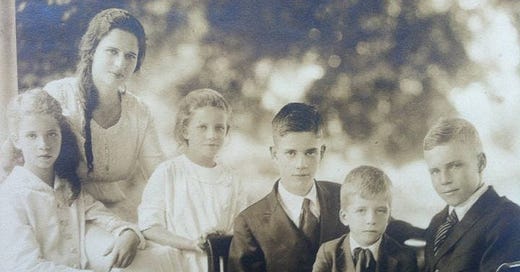On the day before Mother’s Day, I usually post about the origins of the holiday in the 1870s, when Boston reformer Julia Ward Howe decided she would create a “Mothers’ Day” to bring women together to end war. Tonight, though, I have just come from the wedding of our fabulous producer for the Now & Then podcast, where almost the whole team gathered to celebrate, and am thinking about family and how often it has nothing to do with blood and everything to do with chance and affinity.
And that made me reach back a bit farther this year, to a piece I wrote a few years ago about another kind of family….
* * * * * *
Those of us who are truly lucky have more than one mother. They are the cool aunts, the elderly ladies, the family friends, even the mentors who whip us into shape. By my count, I’ve had at least eight mothers. One of the most important was Sally Adams Bascom Augenstern.
Mrs. A., a widow who had played cutthroat bridge with my grandmother in the 1950s, lived near my family in Maine in the summer. I began vacuuming and weeding and painting for her when I was about 12, but it wasn’t long before my time at her house stopped being a job. She was bossy, demanding, sharp as a tack...and funny and thoughtful, and she remembered most of the century. She would sit in her rocking chair by the sunny window in the kitchen, shelling peas and telling me stories while I washed the floor with a hand sponge to spin out the time.
Sally (not Sarah) Bascom was born on December 25, 1903. (That made her almost a full year older than Millard Robinson, a local fisherman who seemed ancient; she loathed that age gap.) She was the oldest of six children and spent her youth taking care of the younger ones. When I once asked her what was the most important historical event in her lifetime, this woman who had lived through the Depression and both world wars answered without hesitation: “the washing machine.” It had freed her and her mother from constant laundry. She could finally have some leisure time, which she spent listening to the radio and driving in cars with boys. Because her mother always needed her at home, it was not she, but all her younger siblings, who went to college. By the time Mrs. A. was an adult, she was certain she wanted no part of motherhood.
Mrs. A. never forgave her sister for driving her Model T through a field. She saved aluminum foil not because of WWII, but because of WWI. She supported herself and refused to marry until she met an older man who offered to take her traveling; they had a quickie wedding and set off for Banff, where they looked at mountains and watched the bears pilfer trash.
She destroyed her knees playing tennis, so she would weed the garden by staggering to a lawn chair set up there. She loved snapdragons and nicotiana, veronica and irises and wild roses. After Mr. Augenstern died, she drove herself to and from Florida once a year in a giant old Cadillac with “Arrive Alive” on the license plate holder; she drove like a bat out of hell. She played bridge with terrifying intensity. And she always refused to be seen in public unless she was in a dress with her hair pinned up and her pearls on.
Mrs. A. laughed at me when I fell in love with history and tried to tell her that people changed the world because of their beliefs. “Follow the money, Heather,” said the woman whose income depended on her knowledge of the stock market. “Don’t pay attention to what they say; pay attention to who’s getting the money.” I listened. And then I learned as I watched her lose my grandmother’s generation and then work to make friends with my mother’s generation. And when they, too, died, she set out, in her eighties, to make friends with my generation. Every day was a new day.
Mrs. A. left me her linens, her gardening coat, and this photo of her and her siblings: Frances (who died young), Phyllis, Carlton, Guy, and Nathan. She also left me ideas about how to approach both history and life. I’ve never met a woman more determined never to be a mother, but I’m pretty sure that plan was one of the few things at which she failed.
Thinking of her, and all the wonderful women like her who mother with or without the title, on this Mother’s Day.



Thank you, Heather. Happy Mother’s Day to you. I never had a « belly born » child, but I mothered a generation of public school children in NYC from 1974-2010. A great life and a great career. Thank you for mentioning your « mothers ».
A beautiful memory and a great read. Thanks.